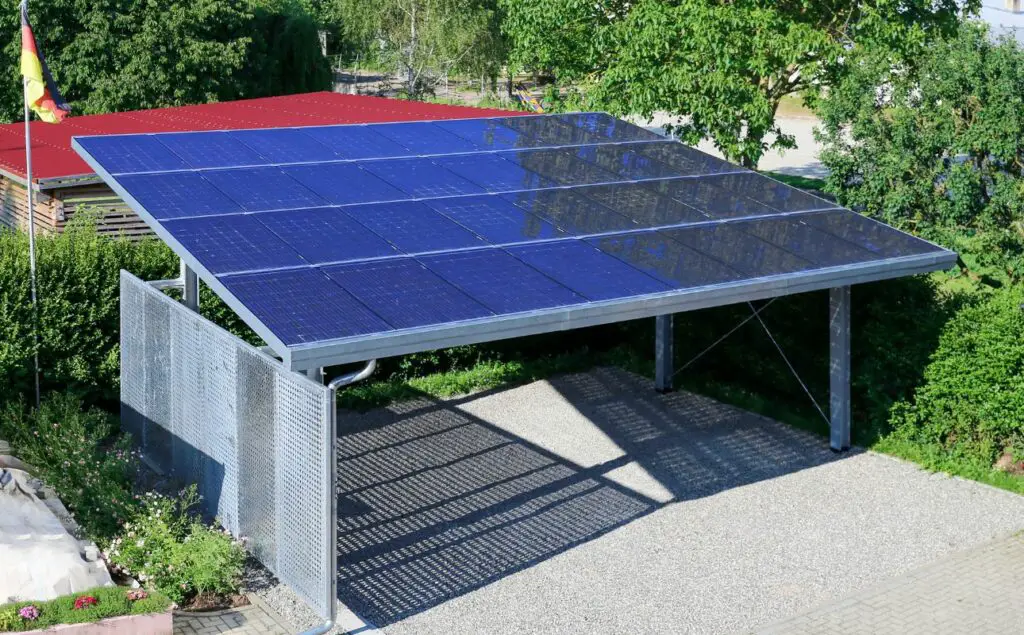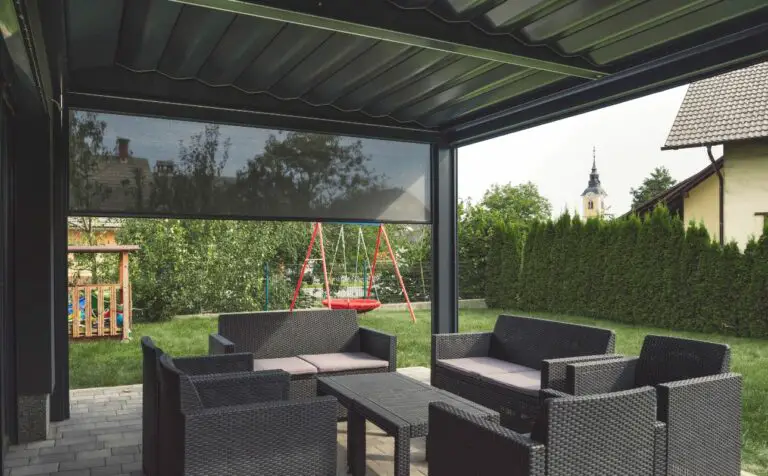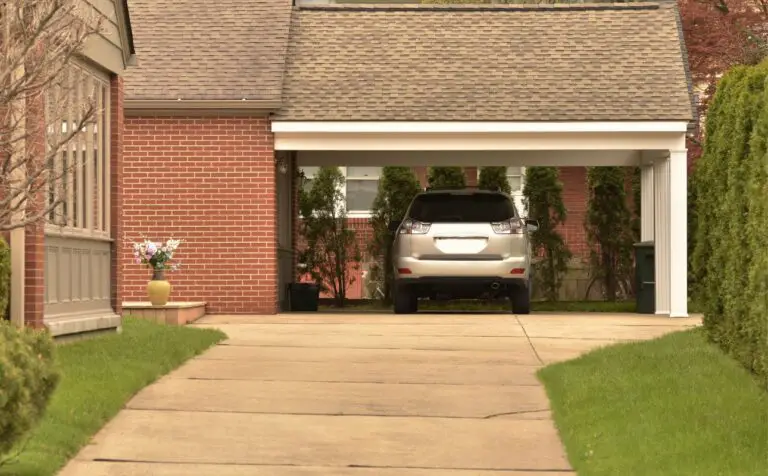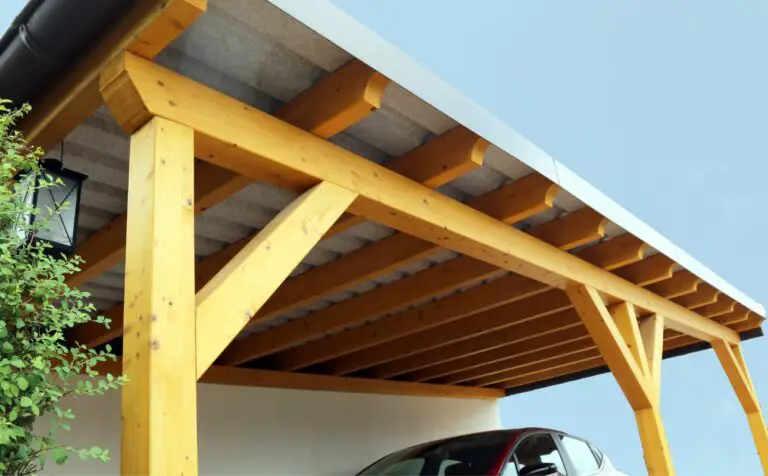What are Solar Carports? (For Beginners)
Have you ever driven around a parking lot, searching for the perfect spot to park under shade? It’s a common sight during hot summer days. But what if we told you there was a solution that not only provided shade but also generated renewable energy? Enter solar carports.
Solar carports are an innovative and sustainable solution that combines the functionality of covered parking with the benefits of solar power. This technology has gained popularity in recent years, particularly among businesses and institutions looking to reduce their carbon footprint while providing practical parking solutions.
In this article, we’ll explore what solar carports are, how they work, their benefits, types available in the market, and considerations when installing one for your property.

Definition of Solar Carports
A solar carport is a building that offers covered parking for cars and has solar panels on the roof. These solar panels use the sun’s energy to make electricity that can be used for many things, like charging electric cars that are parked underneath them, lighting nearby buildings, or feeding the grid.
Most solar carports have a metal frame that holds the solar panels up. Solar carports provide shade and shelter for cars, and they are also a good way to use empty parking spots to make clean, renewable energy. They are especially popular in places where there is a lot of sunlight, and you can often find them in big parking lots like those at businesses, shopping malls, and colleges.
Depending on how much energy you want to get out of a solar carport, the size and amount of solar panels can be very different. Some solar carports are also made with extra features, like built-in charging stations for electric cars or energy storage systems to save extra power for later use.
How Solar Carports Work?
Harnessing the power of the sun to generate electricity and provide shade simultaneously, this innovative technology utilizes a structure that functions as both a carport and a solar panel system.
Solar carports operate by converting sunlight into electrical energy via photovoltaic panels installed on top of the carport’s roof. These panels are positioned at an angle optimal for capturing maximum sunlight, which can then be used to power homes or businesses.
The shaded area underneath provides protection for cars from harsh weather conditions such as hailstorms or excessive heat.
While there are many advantages of solar carports such as reducing reliance on fossil fuels and providing environmentally friendly solutions, there are also limitations such as high upfront costs and limited space availability in urban areas.
Benefits of Solar Carports
Generating electricity while providing shade, this innovative technology offers a dual-purpose structure that combines the benefits of renewable energy and shelter for vehicles.
Solar carports offer numerous advantages, including cost savings on electricity bills and reduced reliance on fossil fuels, which positively impact the environment.
Here are five benefits of solar carports:
- Provide additional parking spaces while protecting cars from harsh weather conditions.
- Allow businesses to demonstrate their commitment to sustainability by using clean energy sources.
- They can be customized to fit any size or shape of the parking lot or garage.
- Require minimal maintenance, making them a low-cost alternative to traditional parking structures.
- They can increase property values due to their eco-friendly features.
With these benefits in mind, it’s easy to see why solar carports have gained popularity as an environmentally conscious and economically viable solution for generating renewable energy.
Types of Solar Carports
Solar carports are structures that offer shade and shelter for vehicles while generating solar energy. There are various types of solar carports, including residential, commercial, and public ones.
Each type serves a different purpose and has unique features depending on the intended users.
Residential Solar Carports
Residential parking structures with elevated rooftop panels resembling a canopy offer an innovative and sustainable solution for households seeking to reduce their carbon footprint.
Not only do these solar carports provide cost-effective options for homeowners, but they also contribute to environmental sustainability by reducing reliance on non-renewable energy sources. Solar carports can also protect vehicles from harsh weather conditions while generating clean energy that can be utilized within the household.
Commercial Solar Carports
Commercial parking structures with elevated panels serving as a canopy are an innovative solution for businesses looking to implement renewable energy practices into their operations while simultaneously providing shelter and protection for vehicles.
These carports offer unique design features, such as adjustable tilt angles and customizable sizes, that can be tailored to the specific needs of each business.
The installation process is streamlined by utilizing pre-manufactured components that can be assembled on-site in a relatively short amount of time. Commercial solar carports not only provide environmental benefits but also have the potential to generate revenue through excess energy production.
Public Solar Carports
Public solar carports are similar to commercial carports, but they are designed to cater to the needs of the general public. They provide parking spaces for electric vehicles while generating clean energy from the sun.
Public solar carports offer many benefits such as reducing carbon emissions, providing shade and shelter for parked cars, and promoting renewable energy use in communities. However, before installing a public solar carport, there are several factors that should be considered such as location, orientation, design, and cost-effectiveness.
To help with these considerations for installing solar carports here is a list of things to keep in mind:
- Location – The location of the solar carport must be carefully selected based on its accessibility and visibility to maximize its impact.
- Orientation – The orientation of the panels should be optimized based on the angle of incidence of sunlight at different times of the day.
- Design – The design should consider factors like load-bearing capacity, wind resistance, and aesthetics.
- Cost-effectiveness – Solar carports funding options must be explored to ensure that they are affordable over their lifecycle.
Considerations for Installing Solar Carports
With the installation of solar carports, there are several considerations that must be taken into account to ensure the successful implementation of sustainable energy solutions.
Site selection is critical as it determines the amount of sunlight exposure the solar panels will receive and thus affects their overall efficiency. Orientation is also important since panels should ideally be pointed towards the sun’s path for maximum energy absorption.
Structural support must also be evaluated to determine if the existing structure can support the weight of both the carport and its solar panels. Cost analysis is another important factor as installing a solar carport can be costly, but long-term benefits include reduced electricity bills and increased energy independence.
An environmental impact assessment should be conducted to determine any potential harm or benefits associated with building a solar carport in a specific location. All in all, careful evaluation of these factors will ensure that solar carports are installed effectively and efficiently, providing sustainable energy solutions while minimizing negative environmental impacts.
The Bottom Line
Solar carports are a sustainable solution to traditional parking structures, generating renewable energy while providing shelter for vehicles. These innovative structures consist of solar panels mounted on top of sturdy and durable frames that offer protection to cars from harsh weather conditions.
The solar panels generate electricity by converting sunlight into usable energy using photovoltaic cells. This energy can be used to power homes, businesses or even the grid.
Solar carports offer numerous benefits such as reducing carbon emissions, saving money on energy bills, and adding value to properties. Additionally, they provide shade for parked vehicles which helps reduce heat build-up inside the vehicle during hot weather conditions.






